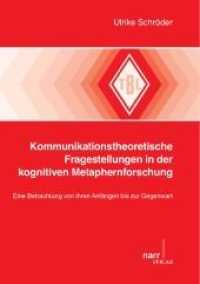- ホーム
- > 洋書
- > 英文書
- > Computer / General
Full Description
The two-volume set LNCS 16320 and16321 constitutes the refereed proceedings of the 23rd International Conference on Service-Oriented Computing, ICSOC 2025, held in Shenzhen, China, during December 1-4, 2025.
The 42 full papers and 21 short papers presented in these proceedings were carefully reviewed and selected from 219 submissions. The papers are organized in the following topical sections:
Part I: Service Foundations; Service Recommendation and Selection; Microservice Architectures; Serverless Computing; and Services at the Edge.
Part II: Software as a Services and Cloud Infrastructure; Privacy, Security and Trust; Services and Business Processes; Quantum Service Computing; and Industrial Papers.
Contents
.-Service Foundations.-From Natural Language to TOSCA: Leveraging LLMs for Automated Service Composition.-RESTful API Service Discovery via Comprehensive Feature Mining, Deep Neural Networks, and Contrastive Learning.-GCLP: Generative Contrastive Learning with Adaptive Prompt-Guided Diffusion for Temporal Reasoning over Service Knowledge Graphs.-MCPybarra: A Multi-Agent Framework for Low-Cost, High-Quality MCP Service Generation.-DHG-LLM: A Dual-Channel Heuristic Greedy Framework for End-to-End Service Solution Construction under LLM Guidance.-Automating Policy-as-code Generation Pipeline for Data Products: an OpenAPI-driven Rego generator.-Service Reccomendation and Selection.-Optimal Subset Oracle-based Web API Composition Recommendation for Mashup Creation.-TSSGCF: Textual Similarity-Supervised Graph Collaborative Filtering for Web API Recommendation.-Dynamic Reputation Measurement of Online Services for Maximizing User Group Satisfaction.-A Multi-view Heterogeneous Hypergraph Augmented Self-Gating Contrastive Fusion Framework for Service Recommendation.-ARrec: A GitHub Awesome Repository Recommendation Service based on Graph Mining.-Microservice Architectures.-GRACE: A Strategic LLM-Enhanced Graph Reinforcement Learning Framework for Adaptive Fault Recovery in Microservice Systems.-Adaptive Modality Compensation via Bi-Mamba Dual-Stream Learning for Microservice Failure Diagnosis under Incomplete Multimodal Data.-Failure Classification for Microservice Systems Based on Variational Graph Auto-Encoders.-Using Guided Community Detection to Improve Existing Microservice Designs.-A Pattern-Driven and LLM-Assisted Approach for Decomposing Monolithic ML-Based Systems into Microservices.-Service-Level Energy Modeling and Experimentation for Cloud-Native Microservices.-MOTSAD: Multi-Objective Optimization for Time Series Anomaly Detection in Microservice.-Predicting Security Weaknesses in MicroserviceArchitectures using Structural Metrics.-Serverless Computing.-Multi-Agent-Driven Dual-Layer Serverless Adaptive Ensemble Inference Method.-Quantifying Serverless Elasticity: The gumeter Benchmark Suite.-HybridFP: Divide-and-conquer Serverless Function Provision for Mitigating Cold Starts.-Services at the Edge.-Service-Oriented AI Model Compression for Computing Continuum Environments.-Optimizing Containerized Edge Service Migration through File-Level Storage Sharing.-Anticipatory Service Migration in Mobile Edge Computing via Spatio-Behavioral Prediction.-Ahead-of-Time Scheduling for Workflow Applications in Edge Computing.-OctoCross: Workload-Aware Request Offloading Scheduling in Cross-Camera Collaboration.-D3FU: Data-Free Distillation Driven Federated Unlearning for Service-Oriented Computing.-Preference-aware crowdsourcing of IoT energy services.-LEADR: A Lyapunov-based Energy-Aware Decentralized Routing Strategy for Continuous UAV Communication Services.-A Non-Intrusive Framework for Deferred Integration of Cloud Patterns in Energy-Efficient Data-Sharing Pipelines.-SCSTL: Spatial Composite Signal Temporal Logic for IoT Service Monitoring.-SDAD: A Service Deployment Method Based on Association Rule and Reinforcement Learning for Edge Computing.-EdgeInfer-TP: A Collaborative Tensor Parallelism Inference System for Heterogeneous Edge Devices.








